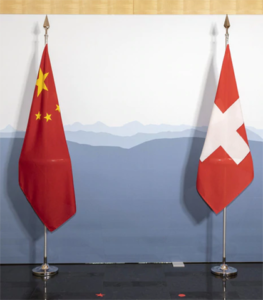Swiss-Chinese ‘snatch pact’ under fire
A ‘secret deal’ between Switzerland and China that allows Chinese authorities to conduct investigations in the country and deport Chinese nationals has come under fire from human rights groups.
The renewal of the deal first signed in 2015 has also sparked debate with in Switzerland over Chinese influence and the ongoing relationship between Bern and Beijing.
 Swiss media reported that talks were in progress to renew the controversial agreement that ends in December.
Swiss media reported that talks were in progress to renew the controversial agreement that ends in December.
In effect the agreement allows Chinese officials to enter Switzerland for a period of two weeks – without official status – to investigate Chinese citizens, and deport them.
The Swiss media cited a Swiss official confirming the “administrative agreement” and that it had been barred from being made public since 2015.
Chinese citizens including rejected asylum seekers, illegal travellers, and those without identity papers are said to be affected by the deal.
But human rights groups say the deal can be used to target Chinese nationals who are fleeing the authoritarian regime including Tibetan refugees and critics of Beijing who are seeking asylum in the country.
Since June 2016, Tibetans have been officially recognised as Chinese nationals by the Swiss government.
Although the Swiss Government has claimed that the change in policy have not affected Tibetan refugee’s eligibility for asylum, approval ratings for Tibetan asylum seekers have fallen drastically over the years.
Only 54.8 per cent of the Tibetan applicants qualified in 2016 compared to 71.8 per cent in 2015 and 85.8 per cent in 2014, according to Human Rights Watch.
A Swiss government statement said that Tibetan and Uighur asylum seekers were not affected by the agreement and that they would not be sent back to China due to the threat of persecution they face.
But the Tibetan community in Switzerland have doubts.
The community says the Bern government’s official recognition of Tibetans as Chinese citizens leaves Tibetan asylum seekers vulnerable to deportation.
“The fact the deal has to be kept secret since 2015 and was recently exposed is a major red flag. I believe Tibetan asylum seekers and Chinese dissidents are exposed to be cracked down under this deal,” a community spokesman said.
“Many of the 300 odd Tibetan refuge seekers in Switzerland were interviewed via telephone under what is known as the ‘LINGA analysis’ where details like dialect, socialization traits of the subject are examined by a person at the other end of the telephone. Who is to say that these procedures are not under the purview of the secret deal?” the spokesman said.
The Swiss opposition has also expressed doubts and called for the deal to be rejected.
Democrat MP Fabian Molina told local media the deal with China should not be
The relationship between Beijing and Bern over the past decade has seen lucrative economic benefits for the Swiss and resulted in the signing of a MoU last year for cooperation on trade, investment and finance for projects in third countries along the routes of the Belt and Road Initiative.












